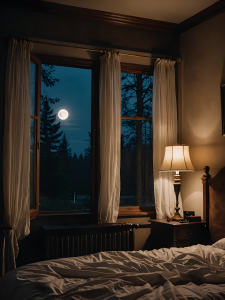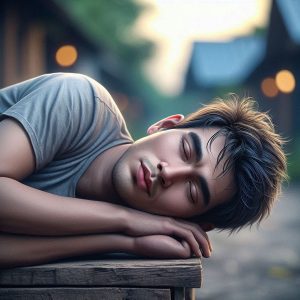Before the invention of artificial lights, our ancestors would sleep when it got dark and wake up when it got light; otherwise, they may have been eaten by predators roaming at night. Plus, there wouldn’t be much to do after it got dark. If you have ever been camping in the middle of nowhere, you know that you can see no more than a few feet in front of you when it’s dark out. The discovery of electricity and the invention of light bulbs have changed our whole sleep/wake cycle. Our body may be unable to differentiate artificial lights from daylight, and this can have severe consequences for our entire bodily systems dependent on the light/dark cycle of the day.
The major problems with artificial lighting are twofold: 1) It suppresses melatonin production, and 2) it disrupts our circadian rhythms (our sleep and wake cycles) (6). I am sure many of you have heard of melatonin. You can buy melatonin supplements, which are supposed to help you sleep, at any Walgreens. Our brain usually releases melatonin naturally, which helps us fall asleep. It also plays a role in the suppression of cancerous tumors and is a powerful antioxidant (6). Melatonin has been found in various plants, including cherries, bananas, grapes, rice, and beer (Wikipedia). Production of melatonin is related to darkness and not length of sleep.
What is light pollution?
Light pollution from all of our artificial lighting scatters off into the atmosphere, which causes an increase in the brightness of the sky called urban sky glow (9). In 2001, the percentage of people living under sky brightness greater than baseline levels was 62%, while the percentage in the US and in Europe was 99% (9). It was found that it took only 39 minutes under a low-level incandescent light for humans to have their melatonin levels drop by 50% (9). That took only 39 minutes, so imagine what happens when you are in your house at night with all of the lights on.
How Melatonin Affects the Body
As the length of light per day changes, the production of melatonin adjusts. The release of melatonin functions as a seasonal clock. In animals, it serves as a biological influence for seasonal activities such as behavior, reproduction, change in outer coat, and camouflage coloring (Wikipedia). Artificial lighting at night interferes with our biological clock, resulting in endocrine disruption (6). Melatonin is an endocrine hormone released directly into the blood by the pineal gland in the brain.
Melatonin can affect various hormones, including lowering libido by blocking the secretion of luteinizing hormone and follicle-stimulating hormone (regulating the reproductive cycle of animals), and it also lowers leptin levels at night (leptin is responsible for decreasing hunger) (Wikipedia). The production of melatonin from the pineal gland is suppressed when light reaches the retina in our eyes and is released when we are in darkness.
Melatonin is a hormone, and like other hormones, it is strictly regulated and performs specific and important functions in our body. Light receptors in our eyes are responsible for sending electrical impulses directly to the biological clock (5). Light coming into these receptors is responsible for regulating circadian functions such as releasing hormones, regulating our body temperature and sleep patterns, and controlling the production of melatonin (5).
Decreased melatonin production and cancer risk
Some scientists believe that this long-term melatonin deficiency can increase certain cancer risks, especially breast cancer. A study in Denmark involving 7035 women found that those who worked at night exhibited a 50% increase in the incidence of breast cancer (6). Many subsequent studies found that women who worked the night shift were at a greatly increased risk for breast cancer, with one study claiming a 70% increase in breast cancer among night workers (6). Studies have shown that breast cancer rates are higher in industrialized countries, citing constant exposure to light as the reason.
Many other studies showing increased tumor growth in those whose melatonin production is altered were performed on rats and mice and not humans. For reasons I will go over at another time, I find that we cannot always generalize animal studies to humans.
How Melatonin May Prevent Cancer
As mentioned, melatonin is a powerful antioxidant, protecting DNA from damage from toxins and radiation (6). About 50% of all cancers result from free radical-damage DNA, so melatonin, in theory, can prevent the DNA damage and thus reduce cancer incidence (6). Because of these facts, the National Cancer Institute said that excessive light exposure increases the risk of cancer and neurodegenerative diseases caused by free radical damage (6).
Melatonin may also indirectly suppress estrogen production, which would further reduce breast cancer incidence (6). A variety of cancer cells have melatonin receptors (6). Melatonin has also been shown to effortlessly enter cancer cells (6). Over the long term, reduced time in darkness each day can result in a melatonin deficiency since we have fewer hours of pure darkness each day to release melatonin (6). Being a powerful antioxidant, constant low levels may leave our body open to attack from oxidation (6).
Melatonin may be related to heart disease. A study showed that patients with coronary heart disease had significantly lowered melatonin levels at night compared to people without heart disease (9). Scientists have found melatonin receptors on circulating cells of the immune system (9). Melatonin has been documented to counteract drugs that suppress the immune system, and it has general immune system-stimulating properties (9).
The Effect of Artificial Lights on Animals
Animals exposed to light at night, whether from light pollution in the sky or from street lights in cities, may experience drastic changes in their behavior and reproductive physiology. Studies with domestic hens have shown that exposing them to artificial light during the winter months caused them to lay more eggs, tricking their bodies into thinking it was summer (9). Rats exposed to continuous dim light experience suspended estrous cycles, which reduce their fertility (9). Trout exposed to long durations of light started spawning two months earlier compared to control fish exposed to ambient light (9).
Light also affects predator-prey relationships. Owls benefit from the increased light, while mice are forced to forage less since they normally forage when it is completely dark outside. You need only to go outside near a street light at night to witness the change in predator-prey relations. Insects are attracted to the street lights, and bats are able to eat all the insects they want without much work, which can affect the ecosystem.
It has long been documented that lighting affects the migrations of birds, which can be confused and attracted to the light and interfere with the orientation direction of migrating monarch butterflies (9). A study showed that underwater lighting stopped silver eels from migrating (9). Animals that base their behavior and mating off of the lunar cycle are easily confused by artificial lighting. A study of animals showed that 90% of those exposed to long days developed tumors, while none of the animals exposed to short days did (9). Overall, animal studies have shown that long day lengths promote tumor growth, whereas short day lengths inhibit tumor growth (9).
The good news
One neat way for night workers to block light, which suppresses melatonin production, is to wear special sunglasses. These sunglasses block out blue-wavelength lights, which are the rays most responsible for causing the suppression of melatonin. You can find cheap pairs at sites like Amazon. Be warned: if you are looking for stylish or trendy sunglasses that block blue-wavelength light, you will need to spend more money. The ones I saw on Amazon were cheap but also looked like bad 1980s sunglasses, which may not be a problem if you just plan on wearing them around the house.
Bright lights are mostly to blame for our melatonin suppression; think of bright street lights, neon signs, electronic devices, and energy-efficient light bulbs. It is best to avoid these lights at night. I would recommend wearing the glasses previously mentioned if you stay up late each night. A sleeping mask may be a good idea. You can also use night lights in the bathroom in the evening so you don’t have to turn on the bright light.
Discussion
We have evolved to sleep at night and to be alert and awake during the day, and it is very hard, if not impossible, for our circadian rhythm to change to the extent that we are readily able to sleep during the day and be alert and active overnight. Our body has evolved to run on a 24-hour schedule. This internal biological clock is even seen in organisms as small as algae (5). Our 24-hour clock is believed to have evolved over 4 billion years ago! That’s just not how we operate.
I was surprised at how much artificial lighting at night can affect animal behavior. If it can change spawning, mating, and migration behavior in other animals, it can surely have powerful effects on us too, since after all, we are animals. The effects on us may not be as apparent, but that does not mean there are not slight alterations in our body’s physiology and immune system from decreased melatonin production.
Conclusion
I agree with the science showing how melatonin affects cancer risk and that melatonin is a hormone that, like all other hormones, is strictly regulated by our brain. It is not a stretch to imagine a disruption in the production and release of the melatonin hormone having negative effects on our body. I do, however, have a hard time believing the cancer studies linking overnight work and exposure to artificial light to cancer. It is just too difficult to separate a lack of sleep from decreased melatonin production. Lack of sleep has a much stronger effect on cancer risk, although decreased melatonin production may also play a smaller role, making overnight shift work dangerous for two reasons.
Sources
1. Reiter, R. J., Tan, D., Korkmaz, A., Erren, T. C., Piekarski, C., Tamura, H., et al. (2007). Light at Night, Chrono disruption, Melatonin Suppression, and Cancer Risk: A Review. Critical Reviews™ in Oncogenesis, 13(4), 303-328.
2. Melatonin. (2014, October 8). Wikipedia. Retrieved August 12, 2014, from http://en.wikipedia.org/wiki/Melatonin
3. Navara, K. J., & Nelson, R. J. (2007). The Dark Side Of Light At Night: Physiological, Epidemiological, And Ecological Consequences. Journal of Pineal Research, 43(3), 215-224.
4. Pauley, S. (2004). Lighting For The Human Circadian Clock: Recent Research Indicates That Lighting Has Become A Public Health Issue. Medical Hypotheses, 63(4), 588-596.





muy bueno saber sobre las relaciones de la electricidad con la melatonina que uno ignora saber
Gracias. Yo estaba sorprender tambien cuando yo leerlo!
Interesting article! It’s is good to know how terrible artificial lighting is for us but you give us solutions. Tks
Thanks! Are you going to start wearing the sunglasses at night?
Really interesting….basically we must approach everytime more to what is natural. Always pleased to read your interesting posts!
Unfortunately, It is a hard thing to do since we live in such a technologically advanced society. We can still try though! Science has brought us many great things but we must not constantly look to science to fix everything. We should focus more on what is in our control. Ample sleep, a good diet, regular exercise and minimum stress are all you really need for great health.
There are so many things happening around us that have an impact in our health all the time and sometimes we don’t even know it. Great Article!
Thanks! There are toooons of things that impact our health that we have no clue about. I will try to bring all of these to light. If you have any topics that you are curious about let me know!
I find this article very interesting. Never thought artificial lights could be unhealthy.
My first though after reading this article is: I want my bedroom to be pitch-black now. I think I will get those blinds that block all the light from outside and check all the lights from electronics in the bedroom. Maybe by doing this I can sleep-in longer during the mornings on weekends (as per my comment on the sleep article);
Also, using nighttime light bulbs or softer lights will help my melatonin and my electric bill. 🙂
yes night lights in the hall and bathroom would be a great idea! Room darkening blinds are a good idea too. You may also need something to block the noise coming from outside. Maybe you can keep a fan on all night to act as white noise.
One of the most important things however is keeping a regular time where you go to bed and one where you wake up. Our brain gets used to that and if you go to bed the same time each night it may help you sleep longer.